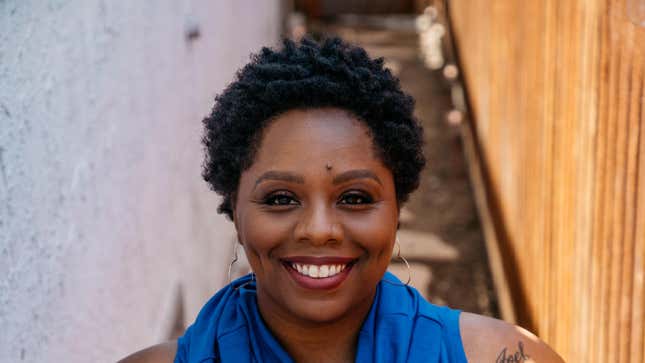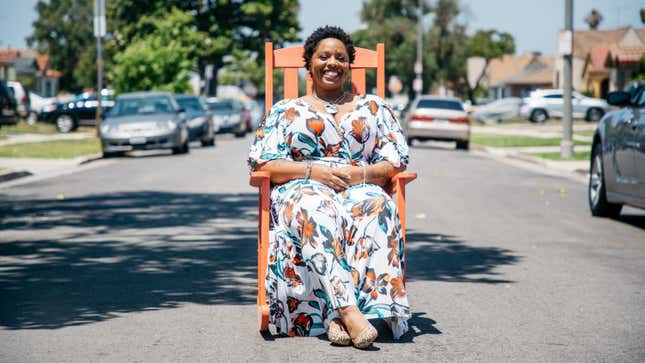
Black lives absolutely matter...and so do our vast and rich array of stories.
Patrisse Cullors, the co-founder of Black Lives Matter (along with Opal Tometi and Alicia Garza) and a 2020 honoree of The Root 100 (her fourth time on the list since 2015), recently made Hollywood headlines when she inked an overall deal with Warner Bros. TV Group to “develop and produce original programming for all platforms including streaming services, cable, and the five broadcast networks.” Intrigued by the inner workings of this deal and how she plans to make her mark on Hollywood within the intersections of grassroots activism, I recently sat down for a phone conversation with Cullors.
“I think it’s important for folks to know that part of the work that I’ve been doing and part of our movement has been storytelling,” Cullors told The Root. “How do we tell a story about the impact the state has had on Black people and a country that is deeply racist and doesn’t actually care about Black people? How do we tell a compelling story where people start to care? So Black Lives Matter is, in so many ways, a storytelling project to really push forward a new vision for Black people. As you know, the media, especially TV/film, has had a long history of not being able to tell the stories of Black people who’ve been freedom fighters. We’ve had the same stories. We know about MLK.”
“There [are] oftentimes stories that come out where there’s Black people who were discriminated against [by] the white community [...] then a white person and Black come together and everybody’s better after they come together,” Cullors continued, her sarcasm evident, even through the phone. “So, I think part of what I’ve been craving inside of Hollywood is more nuance inside of the TV show space about who Black activists are, who Black organizers are and how we have actually been a part of reshaping society.”
Specifically, Cullors has a goal to highlight the stories of Black women who are, in her words, “the shapers of the world.”
“Before I landed this deal, I was actually working for Freeform inside of the writers’ room for Good Trouble, which is a show that has a Black Lives Matter character [Malika Williams, portrayed by Zuri Adele]. And so, I was developing that character in that storyline.”
When Black creators are granted the privilege to be in the room with Warner Bros. execs and other Hollywood gatekeepers, it’s especially integral to make sure Black people are wholly seen and our voices are heard. In these rooms, the question then becomes—how will you use this platform? It’s a question both parties should feel compelled to answer.
This year—amid a general Hollywood reckoning—Warner Bros. was not immune to scrutiny; when Justice League actor Ray Fisher claimed he and other actors were subjected to workplace abuse under the leadership of the film’s director, Joss Whedon, co-stars Jason Momoa and Kiersey Clemons publicly backed the actor’s claims. WarnerMedia subsequently issued a detailed statement regarding the matter, addressing what they stated to be Fisher’s “false claims.”
While the details of the ongoing investigation couldn’t be discussed, I did think it important to ask Cullors what her actionable plans were to make sure Black actors and crew members (and members of other marginalized communities) felt safe on set for her upcoming projects.
“Yeah, I’ve been in some of those conversations,” Cullors confirmed. “I’m very, very, very early development, so I don’t have anything that I can be like, ‘All right, now we’re going to be on set so this is what we should be doing,’ but I am definitely in conversations with execs inside WB. [I’m] very much interested in working with them on how we create an environment, especially for Black people, but folks of color and marginalized communities at large that feel safe and feel like the place that they’re working at is a place where they can leverage their own grievances that they need to and know that there’s going to be zero tolerance for certain behavior.”
In terms of activism-meeting-Hollywood, it seems like Warner Bros. TV has plans to integrate the two even further. A few days after I spoke with Cullors, the studio announced that it had also struck an overall deal with activist and author Kimberly Latrice Jones (I’m Not Dying With You Tonight). When it comes to bridging the long-existing gap between true activism and Hollywood posturing, Cullors is thrilled to bring folks into the Hollywood space such as Blackbird co-founder Mervyn Marcano to produce “some really exciting content” that will be released next year.
Speaking of Hollywood culture, there was one particular passage in Cullors’ recent interview with The Hollywood Reporter that stuck out to me. She noted there was a “marked difference” in celebrity participation in the Black Lives Matter movement “in the past year more than ever,” than there was prior to 2020 (where she saw Hollywood support “here and there”). She specifically shouted out involved celebs such as Yara Shahidi, Kendrick Sampson, Ava DuVernay, Tessa Thompson, America Ferrera, Natalie Portman, Tracee Ellis Ross and more. While some of the aforementioned celebrities have long-standing reputations for their work in activism, the cultural shift this year in Hollywood was quite noticeable.
“Since garnering so much attention and exposure, we are starting to be heard and recognized in ways we could only dream were possible,” Cullors told THR. “I really want to shout out America Ferrera. Her organization [Harness] was founded to amplify the work of people on the ground. We’ve been working together for four years. We met the week after Trump was elected, and we would not have had so much celebrity engagement in this recent uprising if it weren’t for her leadership. America brought in folks like Coldplay and Natalie Portman and Tracee Ellis Ross and Kerry Washington. She was really a validator and ally of our movement. We will need celebrities’ voices to be the validators of us again and not allow the Biden-Harris ticket to marginalize Black progressive movements.”
As such, I was interested in Cullors thoughts about the general dismantling of celebrity culture as we know it this year. In the past several months, we’ve all noticed a shift in the perception of celebrity culture—especially via social media. In a year wrought with increased poverty and death, what we generally value as a society has been re-prioritized. Accordingly, celebrities who were once glorified for their riches and fame are now rightfully receiving immediate pushback to their problematic perspectives.
“Yeah, I love it!” Cullors exclaimed with a chuckle. “I think that—especially with the onset of COVID—[it has resulted in a] death to celebrity [culture]...The essential worker became a celebrity; Dr. Fauci became a celebrity; the people who work to give us answers about what was happening to our lives and how we were impacted…[they] became a celebrity. I think it’s really been a shift in how we understand what’s of value. I’m not saying that—you know, celebrities are human beings—[I’m not saying] they don’t have value. But, what it’s meant for so long is that other people are not valuable; musicians and actors who are well paid—and frankly, rich—are the ones who [were considered those who] should be seen and valued.”

“I’m so grateful that the essential worker, the protester, the Black organizer, the Black activist has become that person,” Cullors added. “I think we really pushed celebrities, in particular, to show up for Black lives this time around and to really leverage their platform for our movement, and that has been of great value.”
So, what exactly can we look forward to from Cullors in the Hollywood space? In September, there were rumors that Prince Harry and Meghan Markle were pitching a documentary chronicling the BLM co-founder as part of their huge Netflix deal.
“I have no idea what that is,” Cullors, who does have a YouTube docuseries highlighting grassroots organizers called Resist, laughed. “Literally, I saw it in the news, but no one contacted me. No one has contacted my rep, so I don’t know what’s happening there.”
What we do know is that Cullors (who told me she enjoys the nostalgia of classic Black TV, such as Family Matters, The Cosby Show, The Fresh Prince of Bel-Air and Living Single) is certainly ambitious when it comes to her future work with Warner Bros. TV.
“My dream project would be doing something scripted on Black artists and creatives during the Harlem Renaissance,” she said, remaining vague for obvious reasons. Imagine the visuals and costuming that could come from that!
I’m intrigued to see what Cullors whips up. As we neared the end of our phone call, I asked if she had any parting words directed to Hollywood gatekeepers to serve as a footnote to this interview. In a simple, yet firm declaration, she said, “Follow our lead and listen to us.”
Period.

